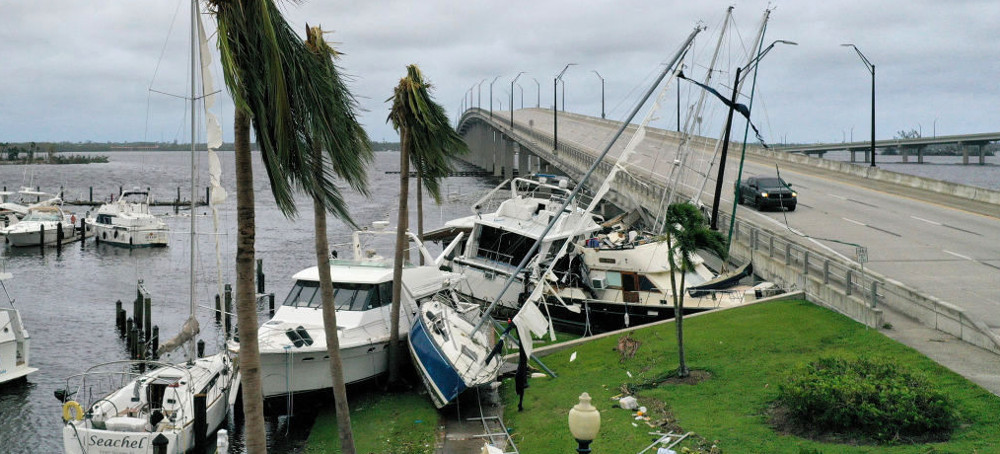Before Hurricane Ian, Florida Republicans Fought Against Climate Disaster Protections
David Sirota Jacobin Boats are pushed up on a causeway after Hurricane Ian passed through the area on September 29, 2022, in Fort Myers, Florida. (photo: Joe Raedle/Getty)
Boats are pushed up on a causeway after Hurricane Ian passed through the area on September 29, 2022, in Fort Myers, Florida. (photo: Joe Raedle/Getty) Before Hurricane Ian, Florida Republicans Fought Against Climate Disaster Protections
David Sirota Jacobin
In June, three months before Hurricane Ian battered Florida, Republican state legislators tried to halt a climate risk disclosure mandate for businesses. They also voted against investing in climate-related weatherization and flood mitigation.
The proposed rules from the Securities and Exchange Commission (SEC) are designed to give investors, government officials, and the general public much more information and details about the dangers of climate change. But even in Florida — one of America’s most climate-threatened states — top Republicans are trying to help fossil fuel industry lobbyists block such disclosure mandates that could better inform communities about climate risks. Those mandates could also help identify which carbon-emitting companies are most responsible for the climate crisis.
On June 15, seven of Florida’s House lawmakers signed a letter to SEC chair Gary Gensler demanding he rescind a proposal that would require large corporations to “disclose extensive climate-related data and additional ‘climate risks.’”
“Congress did not establish the SEC to set climate policy nor to be the final arbiter of businesses’ strategies to combat climate change, which is what these rules will do,” the lawmakers wrote, lambasting the agency for “taking a novel, activist approach to climate policy.”
The following Florida Republican House members signed the letter while pulling in fossil fuel industry campaign cash: Gus Bilirakis ($259,550), Vern Buchanan ($174,490), Kat Cammack ($54,737), Byron Donalds ($60,163), Neal Dunn ($20,902), Bill Posey ($127,000), and Mike Waltz ($71,553).
In a separate letter signed by Florida Republican senator Rick Scott — who has received more than $236,000 from fossil fuel industry donors — thirty-two GOP senators slammed the agency for “mandating climate change reporting requirements that will not only regulate publicly traded companies, but will impact every company in the value chain.”
After the letters, Gensler signaled that his agency could pare back the disclosure rules.
The effort to kill climate risk disclosure rules has long been led by Posey, who represents a district on the central Atlantic coast of the state. In 2011, Posey authored legislation to statutorily bar the agency from requiring corporations to tell investors about the ways climate change affects their business.
“Instead of enforcing climate change policies, the SEC might want to focus its attention on protecting investors from fraud and abuse in the financial markets,” Posey said at the time.
Florida GOP Politicians Still Behaving Like Climate Denialists
Climate scientists say storms like Hurricane Ian that has battered Florida are intensifying more quickly because climate change is warming ocean waters. There appears to be some broader recognition of the link in the state: Between 2019 and 2021, the number of Florida Republicans who believe climate change is real doubled from 44 percent to 88 percent, according to surveys by Florida Atlantic University.
However, many of Florida’s Republican politicians have not reflected that shift.
In Washington, every Republican member of Florida’s congressional delegation voted against an infrastructure bill providing billions of dollars in investments in climate-related weatherization and flood mitigation. Florida Republican governor Ron DeSantis derided the $19 billion earmarked for the state.
Meanwhile, last month DeSantis spearheaded an initiative to bar his state from considering environmental factors such as climate risks in its investment of billions of dollars of retirement savings of teachers, firefighters, and other government workers.
DeSantis, who is running for reelection, has vacuumed in more than $800,000 of campaign cash from oil and gas industry donors, according to data compiled by the National Institute on Money in State Politics. That includes more than $314,000 directly from the coffers of fossil fuel companies.
